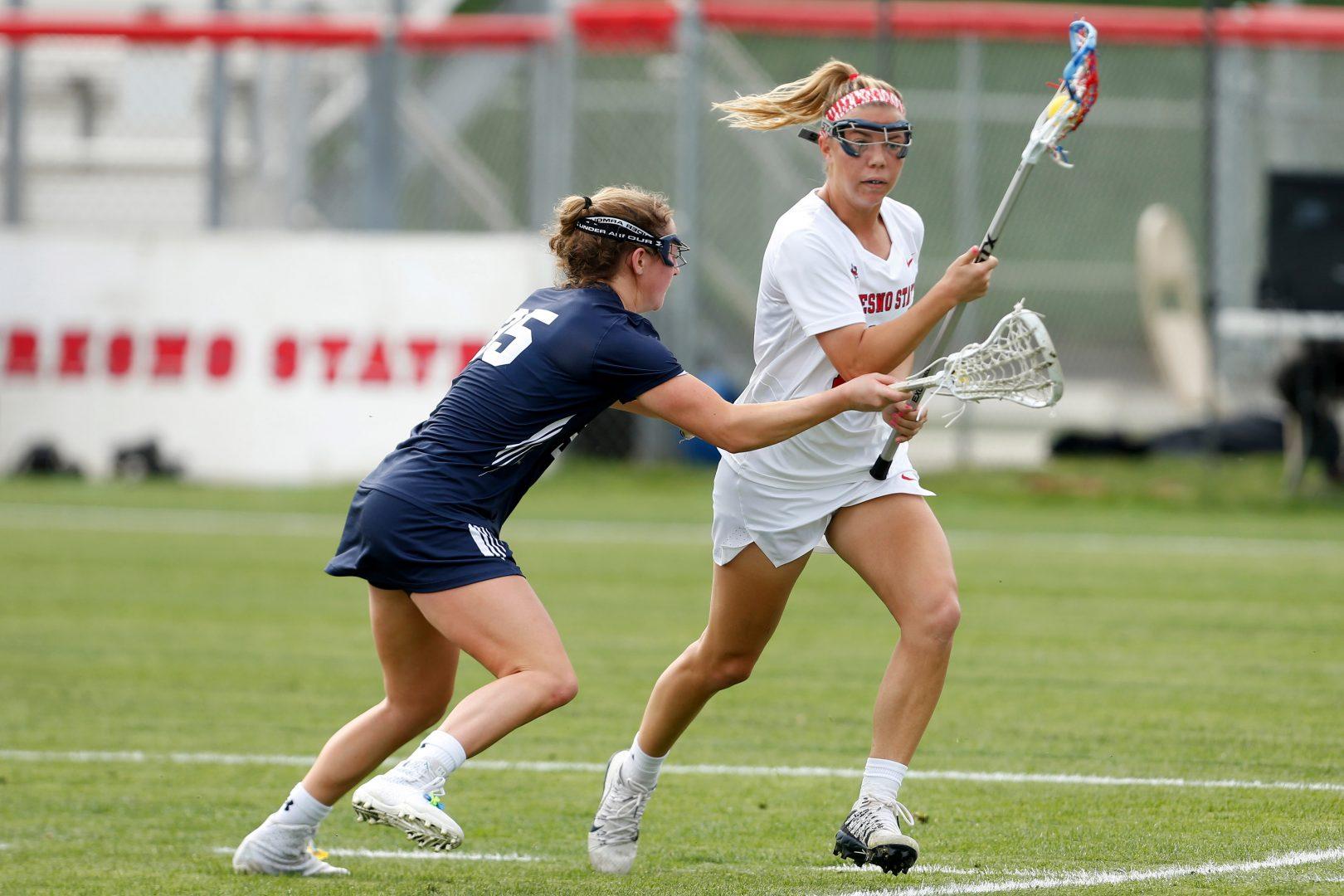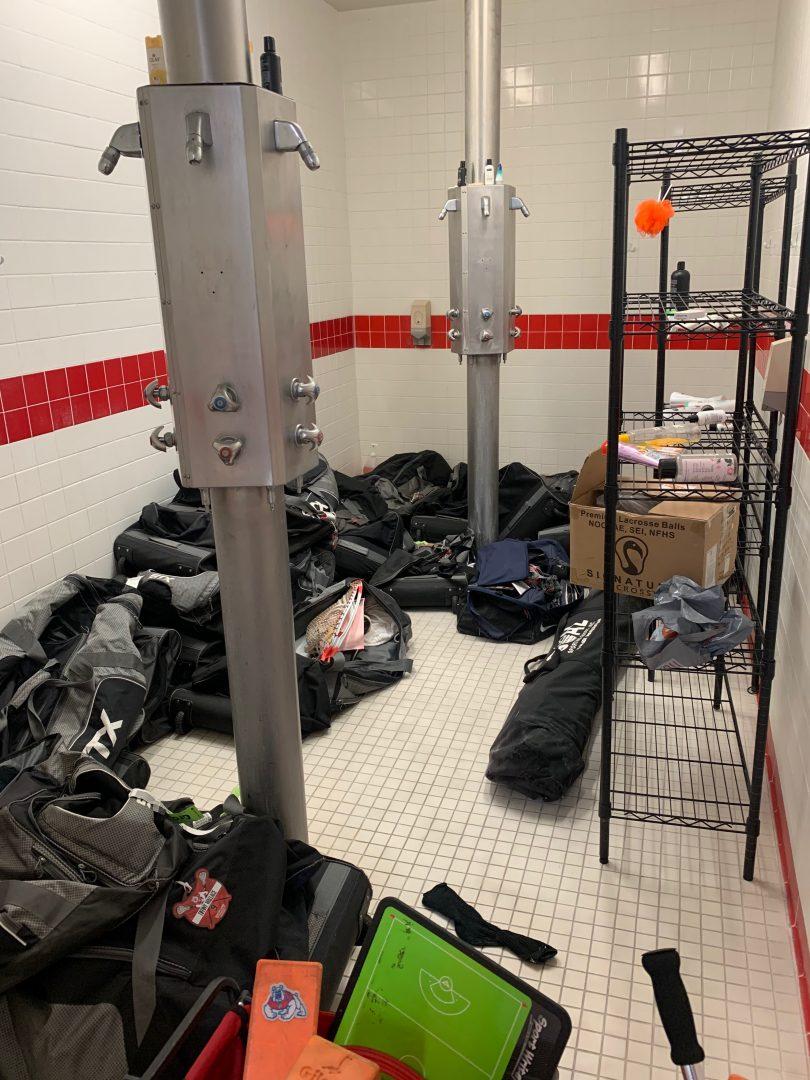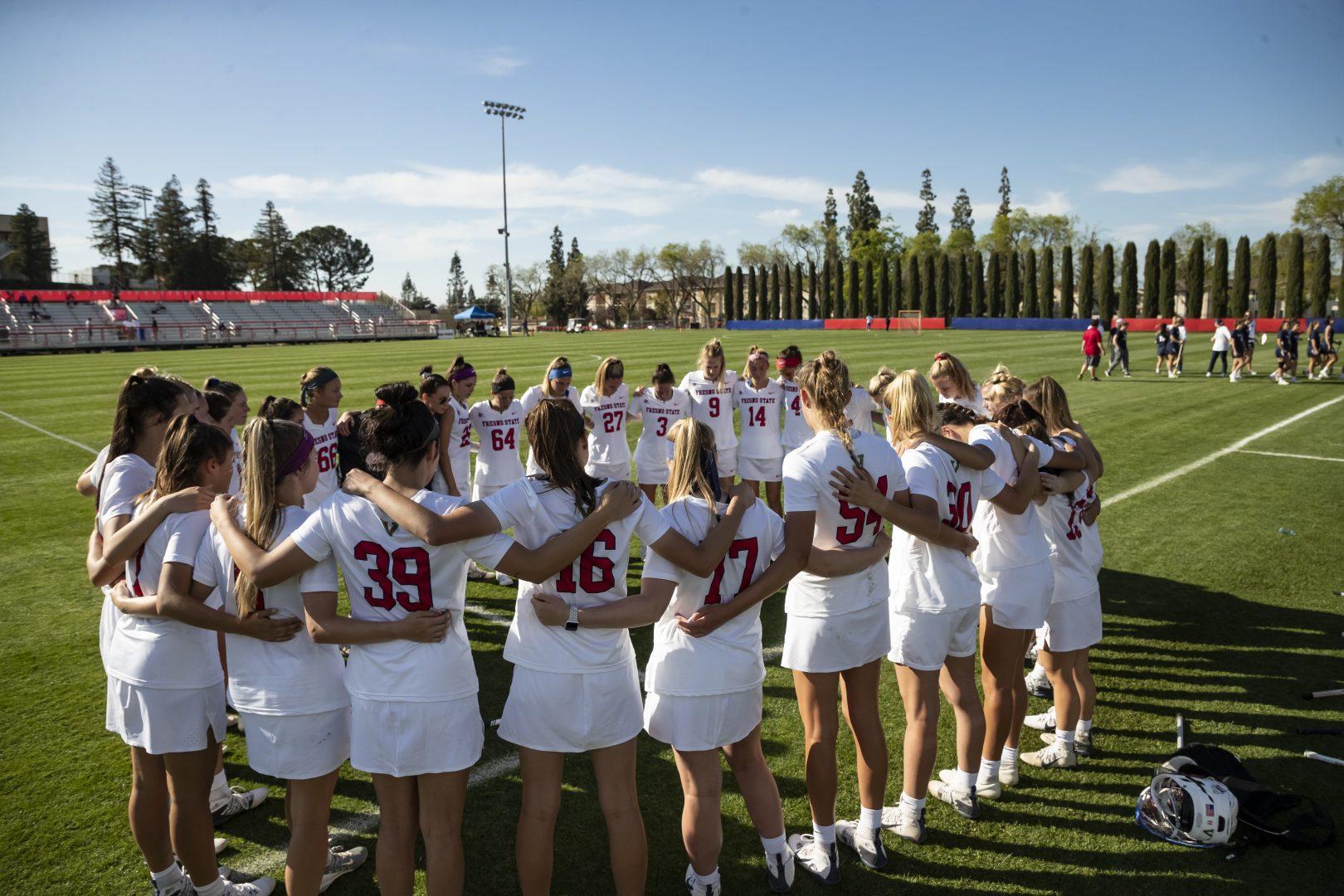Updated Feb. 26, 1:30 p.m.: The Collegian received evidence that shows the lacrosse team’s equipment discarded in the locker room showers after the athletic department moved the football team into the lockers. Megan Walaitis, a player on the team, confirmed this photo shows their equipment in the showers.
When members of the Fresno State women’s lacrosse team filed a lawsuit against the university on Friday, Feb. 12, five players, acting as player representatives, shared detailed experiences and conveyed one goal ”” to no longer be treated as “second class.”
The group of five players, Megan Walaitis, Abbigayle Roberts, Taylor Anders, Hennessey Evans and Tara Weir, provided written testimonies as exhibits in the lawsuit detailing what they felt were violations of Title IX and inequity within the athletic department.
These statements allege disparities in publicity, equipment, COVID-19 protocols and facilities. These five players say they’re seeking equal opportunities in more than just participation.
Walaitis, a fourth-year senior and captain, is a homegrown talent and was destined to don the red and white as a member of the Fresno State lacrosse team. Growing up in Clovis, proximity and longtime involvement with the program was key to her attraction to the program ”” even serving as a ball girl during her formative years.
But what was once her dream has now turned into a heavy burden and deep sadness following the announcement that the program was eliminated after the 2021 season. She said the university has undermined the program since the decision was made.
“The announced elimination of our team has also placed a heavy burden,” Walaitis said in her statement. “I am deeply saddened by the realization that I may never play lacrosse at Fresno State again.”
Beyond the program’s cancellation, at the center of the lawsuit are two instances that Walaitis and the other players highlight as significant examples of mistreatment by the athletic department.

COVID-19 Protocols
Walaitis said in her statement that in instances of COVID-19 quarantines due to possible exposures within the programs, other varsity teams were provided with housing and three meals a day delivered to them during a quarantine.
According to Walaitis, that was not afforded to the women’s lacrosse team. She said that when members of the lacrosse team had to quarantine, they were not provided housing and paid for food at their own cost.
“We were not provided any meals but were given snacks with past-due expiration dates and were told to order in food at our own cost,” Walaitis said.
Walaitis also describes being excluded from the athletic facilities and their locker room following the program’s cancellation announcement.

According to Walaitis, the athletic department provided the football team with their locker rooms while the lacrosse players were locked out. When the football players were moved into the locker room, Walaitis said that personal items were discarded into a shower area, and players were unable to recover the items.
Evans, a freshman and U.S. High School All-American, said the athletic department removed personal items from the lockers and said that players could not get their equipment.
“The athletics department put the personal belongings we kept in our locker room into the showers,” Evans said. “We are treated as though our contributions to the university do not matter.”
Walaitis also said that the university’s COVID-19 restrictions have severely hampered the team’s development. She also said the men’s teams have had far fewer restrictions on preparation than most women’s teams.
“Unlike most women’s sports, the men’s football and basketball teams have been approved to practice, use the weight rooms and play during the COVID restrictions,” Walaitis said. “This has severely limited most other sports activities at the university.”
Anders, a sophomore from Lake Oswego, Oregon, said that Fresno State has shown preferential treatment toward traditional male-dominated sports in its approach to managing the COVID-19 pandemic.
“Normally, fall and spring athletes have access to the athletic training facilities year-round. Fresno State has restricted access to these facilities for social distancing purposes,” Anders said. “In the fall of 2020, spring athletes were not permitted to use the facilities, and my understanding was that the reverse would be true in the spring. I was surprised to recently learn that the football team, a fall team, will continue to have access to facilities throughout the spring.”
Coaching Inadequacy
Multiple players feel that the program’s lack of importance to the university affected on-field performance. The women said that because the athletic department failed to prioritize the program and provide it with adequate coaching, the team struggled on the field.
“In the time that I have played for Fresno State, our team has never been provided the resources necessary to be successful,” Roberts said in her statement. “Our record does not reflect the talent on our team, but rather the athletic department’s failure to provide qualified coaching and basic amenities required by any team.”
Roberts, similar to Walaitis, is a senior and a team captain for the 2021 season. During her time with the Bulldogs, she has received All-Mountain Pacific Sports Federation (MPSF) honors as a defender in 2019.
She is just one of many who have either come into the program with distinguished high school careers or received All-Conference honors during their time with the program. Yet, during her four years with the program, the team has achieved an 18-22 overall record.
On Jan. 8, 2020, previous head coach Jessica Giglio stepped down from her position following a seven-year stint with the program, according to the athletic department, although players say in their statements that she was dismissed.
Roberts said that due to a profound lack of strategic knowledge on behalf of Giglio and her coaching staff, the team lost games. She said the team complained to the athletic department for years about the coaching.
Walaitis also said that she and her teammates raised numerous concerns to the athletic department about Giglio.
“This coach [Giglio] was eventually dismissed, but, since then, we have lacked full and qualified coaching staff and have had no access to position-specific coaching,” Walaitis said. “Instead, Fresno State substituted our assistant coach as head coach without any official job posting, promotion or pay increase.”
The assistant coach promoted was Kara Concheck, who took on the role of interim head coach immediately following Giglio’s departure. Despite the promotion, Roberts said that the university has failed to provide Concheck with the necessary resources to succeed.
“The school then promoted our assistant coach Kara Concheck to ‘interim head coach’ and put a hodgepodge of inexperienced and unqualified people into the assistant coaching positions,” Roberts said.
In contrast, Walaitis feels that men’s sports like basketball and football are always fully staffed with qualified assistant coaches and head coaches.
Evans said, “Fresno State fills coaching positions for men’s teams first. Meanwhile, the lacrosse team was without a permanent head coach for over a year.”
Roberts said she is disappointed that as female athletes the team continually gives the university their best. Yet, the school doesn’t invest any effort or financial resources into recruiting a qualified coaching staff.
Lack of Resources
The players say that the university’s lack of resources isn’t confined to the coaching staff, it also lacks when it comes to the fields, equipment and travel conditions.
Roberts said that during the offseason, the lacrosse team doesn’t have a designated field to practice on and where they do practice is covered with discarded trash from football tailgating.
“We practice on the ‘White Lot,’ which is also the tailgating parking lot during football games,” Roberts said.
In her statement, Roberts added that the team has to clean the field on the Mondays after football games in the fall.
“Before our practice begins, we are required to clean the field ourselves, which is often covered with bottle caps, glass, food, and other discarded trash,” Roberts said.
Additionally, the team has also been left with outdated equipment, according to the statements.
Walaitis said the team had had issues with receiving new equipment and resorting to using goggles and sticks from previous years. The team still receives apparel from the university, except Walaitis said there is no way to identify with its sport.
“Our current team practice uniforms just say Fresno State Bulldogs, instead of identifying our sport like all other varsity practice gear does,” Walaitis said.
Another common grievance Walaitis and Anders shared was the difference in travel and per diem payments during travel between the lacrosse team and other athletics members.
Walaitis said that the team’s average spending on food per diems on the road was smaller than other sports like football or men’s basketball.
In one instance, Walaitis recalls when the team was forced to wake up at 2 a.m. and travel two-and-a-half hours away to fly out of the San Jose airport. Walaitis said this resulted in the team having 17-hour travel days.
Walaitis said that the players were only given $7 to spend on food on this day, which wasn’t even enough to cover most meals at an airport.
Anders said the difference in per diem payments was so substantial that some of the members of the men’s team would be able to keep the leftover money for themselves.
“It is very degrading that, no matter how hard our women’s team works, we are always treated as less valuable or sub-par to the men,” Anders said. “When the women’s lacrosse team travels, we each get a small per diem. Certain men’s teams get a substantially larger sum, and the players end up pocketing most of it.”
Roberts said that even during home games, the team isn’t provided meals before or after the games. She said this is a sharp contrast from the men’s basketball and football programs.
“The men’s basketball and football programs receive the best resources,” Roberts said. “The men’s teams enjoy pristine fields and dedicated practice space, both pre-game and post-game meals, and sufficient per diems to cover the cost of meals during travel for all the players on their extremely large rosters.
For the 2017, 2018 and 2019 fiscal years, the lacrosse program’s spending rose in athlete supplemental meals from $994.33 to $4,161.70 then dipped to $914.16 respectively, and spending in home game meals rose from $2,481.14 to $5,518.58 then greatly dipped to $309.22.
Walaitis said that when it comes to promoting the lacrosse team, the athletic program’s social media department neglected the team.
She added that for media days other varsity sports are allowed to bring the whole team for the event while lacrosse is not.
“Women’s lacrosse was limited to just the four seniors on the team, and the coverage of the team was limited,” she said.
In addition, Walaitis pointed out that between August 2019 and March 2020 the athletic department’s social media made 180 posts about men’s sports and 160 about women’s sports. Out of all those posts, only two were for the lacrosse team.
End of Program Call
In the statements, all the players shared accounts of when they received the news of the program’s cancellation on Oct. 16, a day that many of them were shocked and confused.
On the morning of the cancellation, Roberts said the players were all emailed about a mandatory meeting with Athletic Director Terry Tumey scheduled for the afternoon.
“As I heard tweets and speculation that our team was being cut, I started developing physical pain in the pit of my stomach,” she said.
Roberts then said she immediately called Concheck, and Roberts noted Concheck was also uninformed and worried when Roberts mentioned the team might be cut.
During the Zoom meeting, Roberts said Tumey attended it for seven minutes, announced the team was cut and then left the conclusion to another senior athletics administrator, David Hall, for a few follow-up questions. The full meeting only lasted 10 minutes, Roberts added.
“During those seven minutes, director Tumey not only mispronounced our head coach’s name but also called me by the wrong name ”” after all I have sacrificed to play for this school for three years,” she said.
Anders and Walaitis both corroborate Roberts’ claims in their statements. Walaitis said Tumey took very few questions, and Anders added Tumey let the team know he had to get on another Zoom call in 10 minutes.
“This decision has undermined all the hard work and dedication I put into excelling as an athlete throughout my career and while at Fresno State,” Walaitis said.
Evans said that the decision to cut the team was a surprise to her and she felt betrayed.
“I feel betrayed, belittled, and confused by Fresno State’s decision to cut the lacrosse team. I was surprised that our team was cut, but women’s teams are often treated unfairly and unequally at Fresno State,” Evans said.
The Collegian reached out to the defendants in the civil lawsuit — California State University Chancellor Joseph I. Castro, Athletic Director Terry Tumey and Fresno State Interim President Saúl Jiménez-Sandoval. Tumey and Jiménez-Sandoval did not respond to a request for comment, and a CSU spokesperson said Castro stands by his decision to cut the team in his final months as the Fresno State president.
Written by Zaeem Shaikh, Anthony De Leon and Jesus Cano.




